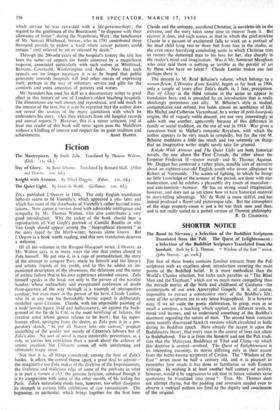Fiction
The Masterpiece. By Emile Zola. Translated by Thomas Walton.
(Elek. r 2s 6d.) ZOLA published L'Oeuvre in 1886. The only English translation hitherto seems to be Vizetelly's, which appeared a ye'ar later and which has most of the drawbacks of Vizetelly's rather hurried trans- lations. Now comes a version done with admirable intelligence and sympathy by Mr. Thomas Walton, who also contributes a very good introduction. Why the jacket of the book should bear a reproduction of Van Gogh's portrait of Camille Roullin or why Van Gogh should appear among the " biographical elements " in the story listed by the blurb-writer, heaven alone knows. But L'Oeuvre is a book worth reading, and this new translation deserves a welcome.
Of all the volumes in the Rougon-Macquart series, L'Oeuvre, as Mr. Walton says, is in many ways the one that comes closest to Zola himself. He put into it, in a rage of premeditation, the story of the attempt to conquer Paris made by himself and the literary and artistic friends of his youth, and to this he added an im- passioned description of the obsessions, the delusions and the sense of artistic failure that in his own experience attended success. Zola himself speaks in the book not only in the person of the novelist Sandoz, whose melancholy and exasperated confession of doubt three-quarters of the way through is a triumph of introspective candour, but even more in the person of his hero, Claude Lantier, who in at any rate his formidably heroic aspect is deliberately modelled upon Cezanne. Claude, with his impossible painting of a nude female figure. livid and hallucinatory, set against the back- ground of the Ile de la Cite, is the most terrifying of failures, the creative artist whose genius refuses to be. born ; but his super- human effort, springing from the desire, as Zola puts it in a pre- paratory sketch, " to put all Nature into one canvas," projects something of the quality not merely of Cezanne's labours but of Zola's also. No sort of novel is more intolerably pretentious, as a rule, or carries less conviction than a novel about the ardours of artistic creation, but L'Oeuvre comes off with unrelenting and ultimately tragic force.
Not that it is, all things considered, among the best of Zola's books. It offers, the central theme apart, a great deal to admire— the imaginative use Zola makes of the doctrine of the Impressionists, the liveliness and malicious edge of some of the portraits in what is in part a roman a clef, the genuine lyricism, subdued though it is by comparison with some of the other novels, of his feeling for Paris. Zola's naturalistic mode here, however, too often dissipates its strength in curious little exhibitions of raw romanticism. The beginning, in particular, which brings together for the first time Claude and the unhappy, sacrificial Christine, is novelette-ish in the extreme, and the story takes some time to recover from it. But recover it does, and such scenes as that in which the grief-stricken Claude in a passion of excitement falls to work on a portrait of his dead child lying two or three feet from him in the studio, or the even more horrifying concluding scene in which Christine tries to restore the demented man to his love for her, stay sharply in the reader's mind and imagination. Was it Mr. Somerset. Maugham who once said there is nothing so terrible as the ptirSbit of art by those who have no talent ? Claude Lantier makes one feel perhaps there is.
The descent to M. Rend Behaine's volume, which belongs to a roman-fleuw, L'Histoire (rune Societe, begun as far back as 1904, only a couple of years after Zola's death, is, I fear, precipitous. Day of Glory is, the th'ivd volume in the series to appear in translation here, and is preceded by an introduction that is really shockingly portentous and silly. M. 13ehaine's style is studied, contemplative and refined, but holds almost no semblance of life. His Michel and Catherine Varambaud, he a writer of petit-bourgeois origins, she of vaguely noble descent, are not very interestingly at odds with one another, apparently because of this difference in family or social tradition, on the eve of war in 1914. War gives a rancorous twist to Michel's romantic Royalism, with which the author appears to be very much in sympathy, but for the rest M. &Elaine meditates 'a little too much and too solemnly on things tllit an imaginative writer might surely take for granted.
Knight With Armour and The Quiet Light are both historical novels, the 'one about the First Crusade, the- other about the Emperor Frederick II—stupor mundi—and St. Thomas Aquinas. Mr. Duggan has contrived a rather plain, sensible sort of narrative about an eighteen-year-old English youth who swore allegiance to Robert of Normandy. The scenes of fighting, to which he brings no little knowledge of the armour of the period, are done with nice moderation, and he exhibits a pleasantly dry touch of masculine— and anti-feminist—humour. He has no strong visual imagination, however, and does not as yet know how to turn historical material to story-telling advantage. Mr. de Wohl is more skilful, and has indeed produced a fluent and picturesque tale. But the atmosphere of the stage property-room is just a bit too thick now and then, and is not really suited to a potted version of Thomist philosophy.
R. D. CHARQUES.


































 Previous page
Previous page